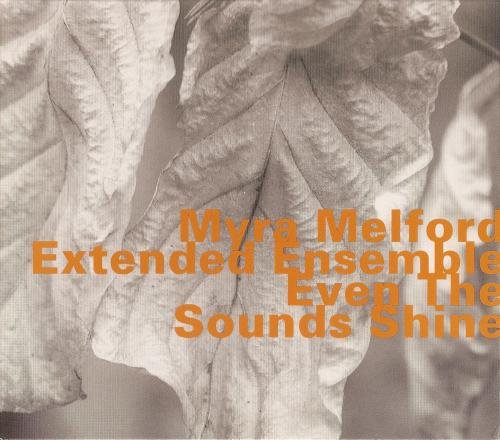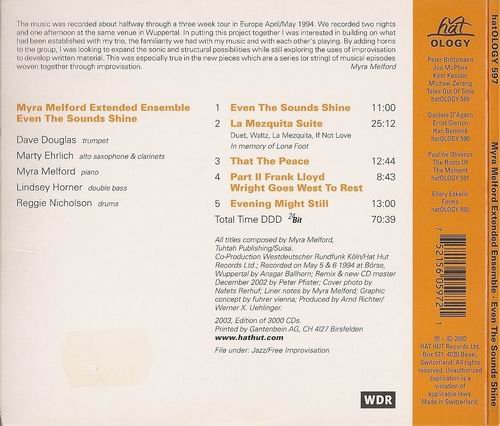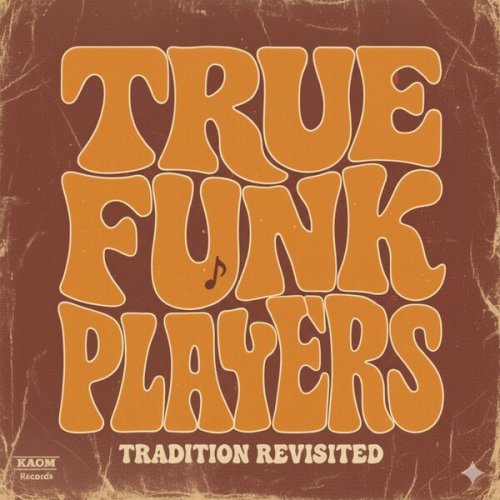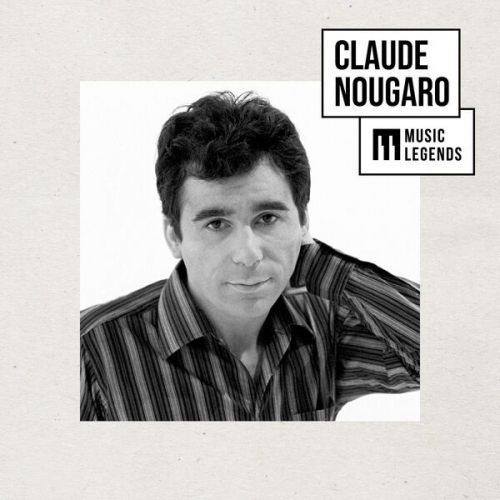Myra Melford Extended Ensemble - Even The Sounds Shine (1994)

Artist: Myra Melford Extended Ensemble
Title: Even The Sounds Shine
Year Of Release: 1994
Label: hatOLOGY [hatOLOGY 597]
Genre: Jazz, Free Improvisation, Avantgarde
Quality: FLAC (image + .cue,log,scans) | MP3/320 kbps
Total Time: 70:39
Total Size: 393 MB(+3%) | 167 MB(+3%)
WebSite: Album Preview
TracklistTitle: Even The Sounds Shine
Year Of Release: 1994
Label: hatOLOGY [hatOLOGY 597]
Genre: Jazz, Free Improvisation, Avantgarde
Quality: FLAC (image + .cue,log,scans) | MP3/320 kbps
Total Time: 70:39
Total Size: 393 MB(+3%) | 167 MB(+3%)
WebSite: Album Preview
01. Even the Sounds Shine (Melford) - 11:00
02. La Mezquita Suite: Duet, Waltz, La Mezquita, If Not Love (Melford) - 25:12
03. That the Peace (Melford) - 12:44
04. Part II Frank Lloyd Wright Goes West to Rest (Melford) - 8:43
05. Evening Might Still (Melford) - 12:59

personnel :
Dave Douglas - trumpet
Marty Ehrlich - alto saxophone, clarinets
Myra Melford - piano
Lindsey Horner - double bass
Reggie Nicholson - drums
This release from Myra Melford's first Extended Ensemble tour -- trumpeter Dave Douglas and saxophonist Marty Ehrlich were added to a trio which included bassist Lindsey Horner and drummer Reggie Nicholson -- is revealing in that it displays more than any of her other recordings; she's charting her own development while in transition. Of the five pieces here, two, "That The Peace," and "Evening Might Still" were written purposely for the trio plus horns; they score in lots of room for improvisation and dynamic while being closely arranged. Of the others which were written for the trio and expanded upon, the "La Mezquita Suite," which encompasses four different compositions, explores how many pairings and trios can exist inside them. There is plenty of room for soloing, but it is interesting to note how Melford's own role changes from one movement to the next. The title composition is an exercise in both the interplay of sonorities and in how, in various intervals, one instrument, when shaded by others, can take on an entirely different persona. In all, Even The Sounds Shine is a beautifully guided tour through Melford's musical psyche of the time. Possibilities and problems present themselves with startling regularity and are either resolved, transmuted, or abandoned. This is exhilarating listening, and a historical look at Melford's development as a composer as she moved from her trio setting into something more dimensional and challenging.~Thom Jurek


![Danakil Safari - From the Soil (2026) [Hi-Res] Danakil Safari - From the Soil (2026) [Hi-Res]](https://www.dibpic.com/uploads/posts/2026-02/1771561850_h6jyygzrq1lpb_600.jpg)

![Stephen Parisi Jr. - Buddy! (2026) [Hi-Res] Stephen Parisi Jr. - Buddy! (2026) [Hi-Res]](https://img.israbox.com/img/2026-02/20/fvrxk8mfalmhx2kjnbwaetofm.jpg)

![Ricky Alexander - Ragology (2026) [Hi-Res] Ricky Alexander - Ragology (2026) [Hi-Res]](https://img.israbox.com/img/2026-02/20/u639cld2jig2t4c8jzdm3cvgb.jpg)

![Tom Oren - Dark Lights (2026) [Hi-Res] Tom Oren - Dark Lights (2026) [Hi-Res]](https://www.dibpic.com/uploads/posts/2026-02/1771427884_tdqtmzk78zgcb_600.jpg)
